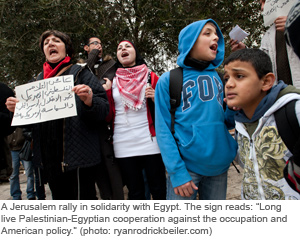 After decades of repression by autocratic dictators, the restless masses in the Middle East and North Africa are going to the streets -- most of them nonviolently -- and asking their leaders to step down. Egypt and Tunisia have succeeded in getting rid of their dictators, but masses in 20 other Arab countries are yearning for freedom and independence from failed regimes.
After decades of repression by autocratic dictators, the restless masses in the Middle East and North Africa are going to the streets -- most of them nonviolently -- and asking their leaders to step down. Egypt and Tunisia have succeeded in getting rid of their dictators, but masses in 20 other Arab countries are yearning for freedom and independence from failed regimes.
As followers of Jesus, our question becomes "How do we respond to what is happening?" How shall we respond to the cry of the masses in Libya, Yemen, Bahrain, Jordan, Syria, and all countries wherein restless masses yearn for freedom and democracy? What do we do when we turn on our television sets and see the bodies of men and women who have been shot and killed by their own security forces simply for going to the streets to stand for reform? Many of us may immediately turn the dial to our favorite soap opera or sitcom. We may turn the television off so as not to be disturbed by what we see. Some may even turn to a channel that will doctor the news in the way they like to hear.
As God's people, we need to ask the question "How would God respond to this, and how does God want us to respond?" God does not want the church to hide, to wait for the storm to pass, or to stand on the sidelines as if watching a boring football match.
Matthew 12:15-21 helps us to understand how Christ would respond to the needs of the hurting masses and how we, his followers, should in turn respond. In this passage, Matthew quotes the book of Isaiah to describe the ministry of Jesus and the word "justice" is used two times. Verse 18 prophetically states that Jesus, filled with the Holy Spirit, will proclaim "justice to the nations." Verse 20 reveals to us that Jesus is the one who will persist "until he has brought justice through to victory."
Have you heard the cries of the people on the streets of Bahrain? Did you focus on the news enough to hear the demands of the people on the streets of Jordan and Yemen? The masses are seeking an end to injustice. These are not the revolts of well-paid politicians or religious leaders. These are the revolts of the poor, the hungry, the unemployed, the disenfranchised, and those who feel betrayed by their governments. They want to see economic, political, and social justice realized. Since our Lord is the champion of justice, surely we, God's people, will stand with the masses who seek justice.
In verses 19-20, we learn that Jesus is the champion of nonviolence. He does not quarrel and scream in the streets. He will not hurt anyone physically or emotionally. When Matthew writes, "a bruised reed he will not break and a smoldering wick he will not snuff out," he means that Jesus will not let people lose hope. He will gently blow on that wick until he revives the flame and hope is restored. Jesus was predicted to be the champion of nonviolence hundreds of years before he was born. Mahatma Gandhi, Martin Luther King, Jr., and Nelson Mandela are a few of the students who learned nonviolence through the life and example of Jesus.
It was phenomenal to watch how the masses in Egypt and in Tunisia went to the streets nonviolently to seek reform and justice. Most violence that we witnessed on our television screens was perpetrated by the agents of the autocratic regimes. Many in Libya, Bahrain, and Yemen have given their lives as they nonviolently walked the streets of their capitals seeking reforms.
How are we to respond to the news happening around us?
First, find out what is happening. I am not asking you to be an expert on each situation, but generally be aware of what is going on. Hear the cry of the masses. Allow your heart to feel some of their suffering.
Second, find out your government's policies and call on your government to do justice for the masses.
Next, pray for the nations, including your own nation. Many attribute the success of the revolution in Egypt to the young people who used Facebook and Twitter to communicate. In Christ, we have a built-in computer. We can see the face of God. And we can always tweet messages to heaven on behalf of the restless masses.
Finally, ask the question: "Lord, is there anything that I can do?"
 Rev. Alex Awad is the director of the Shepherd Society, a local ministry of Bethlehem Bible College, serving marginalized families in the West Bank. He is also the pastor of East Jerusalem Baptist Church, an interdenominational and international congregation which meets in the Wadi Al-Joz neighborhood of East Jerusalem.
Rev. Alex Awad is the director of the Shepherd Society, a local ministry of Bethlehem Bible College, serving marginalized families in the West Bank. He is also the pastor of East Jerusalem Baptist Church, an interdenominational and international congregation which meets in the Wadi Al-Joz neighborhood of East Jerusalem.
Got something to say about what you're reading? We value your feedback!